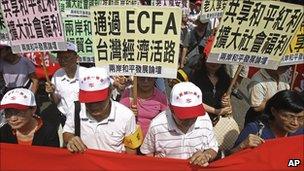Taiwan-China trade deal passed by Taipei legislators
- Published

Taiwan's parliament has approved a wide-ranging trade pact with China, despite a boycott by the pro-independence opposition.
China is seen to have made the greater economic concessions for a deal meant to seal a political rapprochement.
Taiwan will continue to bar labour from China, its biggest trading partner.
But the deal has proved intensely divisive on the island and the Taiwanese government refused to grant a popular referendum on the issue.
The Economic Cooperation Framework Agreement (ECFA) was passed with 68 votes for and none against in the 112-seat parliament.
Sovereignty?
"The ECFA is extremely important to Taiwan if it hopes to avoid being marginalised economically amid an increasing number of trade blocs," said Cheng Ching-ling, a legislator with the pro-China Kuomintang (KMT) party.
"Once the agreement becomes effective, which is inevitable now, Taiwan will lose its sovereignty and become like Hong Kong and Macau," said Tsai Huang-lang, a legislator for the main opposition Democratic Progressive Party.
Outside parliament protesters shouted slogans against the deal, including "[President] Ma Ying-jeou is selling out Taiwan" and "ECFA means more unemployment".
The pact provides Taiwanese firms with access to banking and insurance markets in China, and cuts tariffs on hundreds of Chinese and Taiwanese products.
It could boost bilateral trade that already totals $110bn (£73bn) a year.
The deal was signed by the Chinese and Taiwanese leaders in June.
At the moment $80bn in goods flows to China, and $30bn to Taiwan.
Almost $14bn worth of Taiwanese goods exported to China will have their tariffs reduced or removed.
Taiwanese companies will also gain access to a number of mainland service sectors, including banking and insurance.
Chinese exports worth just under $3bn will see their tariffs lowered.
Chinese Premier Wen Jiabao has previously said that his country "can give up our profits because Taiwanese compatriots are our brothers".
Taiwan and China have been governed separately since the end of a civil war in 1949.
- Published29 June 2010
- Published29 June 2010
- Published26 June 2010
- Published21 May 2010
- Published22 December 2009
- Published12 April 2008